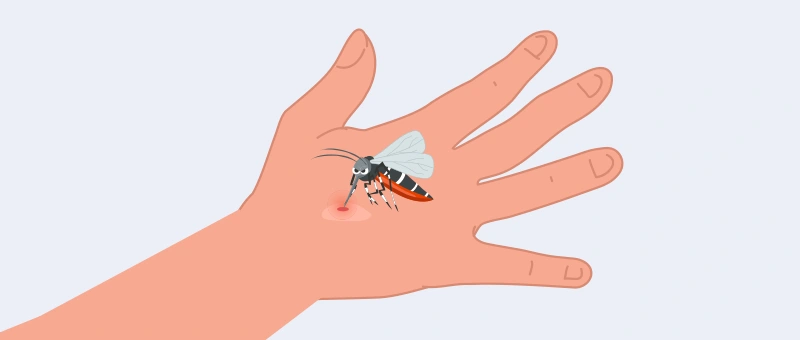West Nile Virus: Symptoms, Treatment & Prevention
Medically reviewed by Andres Maldonado, M.D. | Updated Sep 14, 2023

West Nile virus was largely unheard of in the United States before 1999, when an epidemic broke out in New York City. This virus typically causes a mild flu-like illness, but the more severe form of the illness can result in life-threatening brain and spinal cord inflammation (West Nile encephalitis, meningitis, or meningoencephalitis). Please continue reading to find out more about the symptoms of West Nile virus as well as the treatments and tips for prevention.
How does West Nile fever spread?
West Nile fever is a viral infection. It is caused by the West Nile virus, which infects humans, horses, some other mammals, birds, and mosquitoes. The West Nile virus spreads to humans through the bite of an infected mosquito.
Rarely, West Nile virus can also spread through blood transfusions, transplanted organs, from pregnant women to their baby, and possibly through breastfeeding.
More than half of all West Nile infections occur during epidemics in Africa. However, outbreaks have been reported in other parts of the world, including North America, Europe, the Middle East, and Asia. In southern regions, West Nile fever is a year-round risk, while in more northern climates, it tends to occur in the late summer or early fall.
Is West Nile virus contagious?
West Nile virus is not contagious, meaning it does not spread from person to person. You get WNV from mosquito bites. For example, when a mosquito bites an infected bird and then bites you. Crows, jays, magpies, and ravens are commonly linked to this virus, but it has been found in more than 100 species of birds.
What are the signs and symptoms of West Nile virus?
Most people infected with West Nile virus develop a mild, flu-like illness that lasts for a few days. They may recover at home without realizing they have West Nile virus.
Approximately 1 in 5 people infected with WNV develop a febrile illness called West Nile fever. Signs and symptoms include fever, headache, body aches, skin rash, diarrhea, vomiting, and enlarged lymph glands. These symptoms can resemble other infections, and only a healthcare provider can make a confirmed diagnosis of WNV.
In around 1 in 150 people, the virus causes a severe illness by crossing into brain tissue and causing inflammation (this is called West Nile encephalitis or meningitis). Signs and symptoms include high fever, headache, neck stiffness, extreme lethargy or stupor, muscle weakness, confusion, disorientation, tremors, seizures, paralysis, and coma. Risk factors for severe illness from WNV include age over 65 years, a weak immune system, and health conditions such as hypertension, diabetes, kidney disease, and cancer.
How long does the West Nile virus last?
Symptoms usually appear 3-14 days after exposure to the virus. In mild cases, the illness lasts 3-6 days. However, full treatment for the more severe form can take weeks or even months, requiring medical and nursing care in the hospital.
How do doctors diagnose West Nile virus?
Doctors can confirm a diagnosis of West Nile by performing a blood test to check for antibodies to the virus. In suspected cases of West Nile encephalitis or meningitis, a lumbar puncture can be done to check the cerebrospinal fluid for WNV antibodies.
What is the medical treatment for West Nile virus?
There are no specific medications or treatments for the West Nile virus. Antibiotics do not work against viruses.
The mild form of West Nile virus may not require any special treatment. You can usually recover at home with rest, fluids, and over-the-counter medications to manage your symptoms.
If you develop symptoms such as high fever, neck stiffness, severe headache, muscle weakness, tremors, confusion, vision loss, numbness, or seizures, you should seek immediate medical attention. Again, there are no specific treatments. Management of West Nile in the hospital consists of IV fluids, mechanical ventilation, and other supportive measures as needed by the patient.
Is there a vaccine for West Nile virus?
There is no vaccine to prevent West Nile virus in humans.
How to prevent West Nile virus?
The CDC recommends the following steps to prevent bites from an infected mosquito and lower your risk of getting West Nile virus:
Use insect repellent containing DEET when outdoors. You can also spray your clothing with DEET or permethrin products.
Wear thick, long-sleeved shirts and pants treated with insect repellents (mosquitoes can bite through thinner materials).
Stay indoors at dawn and dusk when mosquito activity is at its peak.
Get rid of stagnant water around your home, as this can serve as a breeding ground for mosquitoes.
References:
Like this project
Posted Sep 17, 2023
West Nile virus typically causes a mild flu-like illness, but can also be more severe. Find out more about the symptoms of West Nile virus as well as the treat…
Likes
0
Views
4



